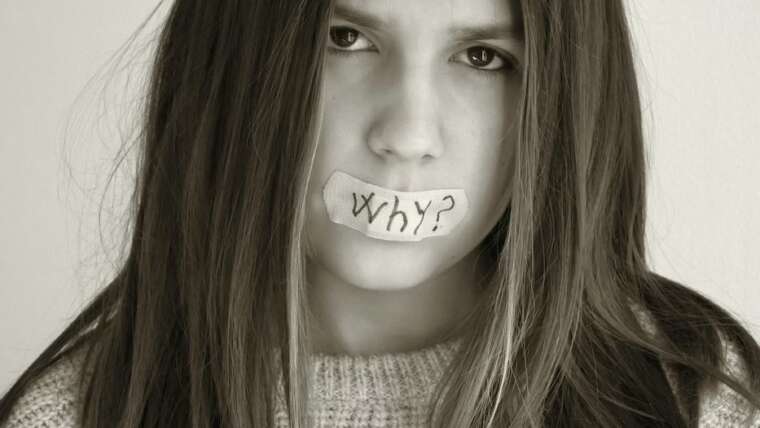Self-Disclosure: A Vulnerability or Strength?
Overview
A very close friend of mine visited my clinic and we went to a local café to spend some time together and had a heart-to-heart talk, after coming back to the clinic with him I wanted his help in moving a heavy chair, and in response to that he told me that he had suffered from some kind of neuromuscular problem in his arms and won’t be able to do the moving.
On another occasion, a relative of mine visited my house and he won’t go upstairs to say hello to my mom when I insisted he told me that he had some visual problems and won’t be steady on the stairs.
What both these friends did was perfectly normal, an avoidance of self-disclosure. It’s only normal not to share one’s health issues with others.
There was an occasion I was sitting with a group of friends and one of them announced, “Kishore you may not know this, but I was recently diagnosed with malignancy and am receiving treatment. It’s nothing serious and helpfully I will be out of it within the next few months.” I’m just thinking that he may have thought that it was the demand of a closer friendship that he shared this information with me. It’s better coming from him directly than from somebody else and I was grateful to him for sharing this very personal and painful experience with me on this occasion.
I’ve noticed that during my telephone conversations with an uncle of his, he makes a start with volunteering information about himself, his wife and children, and his work without me asking for it and the conversation becomes very smooth and easy flowing, this results in me self-disclosing bits of my life in between our topic of discussion. It becomes a very friendly and trusting conversation. He knows the limits of confidentially and has very rarely shared any details of his family that could make them uncomfortable. He doesn’t share any details of his family that they themselves wouldn’t have shared with me.
As opposed to this I have an aunt, and when speaking to someone she loses awareness of the boundaries of confidentiality and announces very personal details of her children and grandchildren that they themselves would have never disclosed. As a result, her own family members don’t share their personal issues in front of her, as it would be like announcing them on social media.
Contrary to this attitude I have a close relative who is a very private person, and whenever I ring him asking how he was. He would say everything is fine. When I specifically ask about his children he would say they’re doing alright even though they had some major issues, when asked about his job he would say, “it’s fine, and the conversation is at risk of coming to an abrupt end. However, I keep the conversation going by self-disclosure, I start talking about what I have been doing in the last few days, and what I’m going to do in the future and share other details i.e. the films I’ve seen and how good they were, I also ask for his opinion on different topics that appear in the newspapers. In spite of this prodding, the conversation still remains brief, and I feel unsatisfied and feel as though I was talking to a stranger and not to a close relative. I can understand this as his reluctance to share things specifically with me, but he avoids self-disclosure with all his close relatives. I’m not sure what to make of this level of secrecy, and how can one develop a close relationship.
One might think that disclosing personal details can make you feel vulnerable. However, allowing yourself to feel vulnerable by way of self-disclosure can also be seen as a sign of strength rather than weakness if it is done in a planned manner with a clear objective of helping the other person or nurturing a relationship and doing what is expected of you in the given situation.
We find that people sometimes hesitate in asking questions related to the information they would like to have, whereas some elderly people don’t hesitate in asking those questions such as – how much do you earn, why don’t you plan a child, or get married to your long-term boyfriend, etc. These are the questions even youngsters would also be interested in asking but they don’t. However, they would pay keen attention if somebody else asks those questions in front of them.
It, therefore, seems to me to be a good practice to volunteer this info if you think the other person would be interested in knowing and that the relationship is such that you owe it to the other person to disclose this information, as my friend did in relation to his malignancy.
Let’s examine why some people are unnecessarily secretive and they divulge information only on a need-to-know basis.
Secretiveness can be a sign of low self-esteem, that after hearing what I have just said the other person will see me in a negative way.
These are the people who want to be in control and by controlling the information they think they can control the situation.
They can control others if they have information about them but others can’t control them if they don’t have such information about them. It’s very much like some individuals who want to sit in a restaurant with their backs against the wall and facing the whole crowd in front of them. So that they can see everyone else and not everyone may be able to see them or can’t get behind them and harm them.
To stop people from controlling them – Teens pick and choose what they to want to tell their parents, thus limiting their parent’s control over their daily activities. Or it could be that they already know what the parent is going to say and it will lead to an argument.
They feel vulnerable – that if the information is out – it can be abused by the other person or can be used against them.
They feel paranoid that others will definitely make use of this information to harm them.
For some, it may just be a personality trait described as he is a very private person. They themselves don’t know why they are not being open with others. Perhaps they haven’t learned it from their parents. It is related to not having an opportunity to be open rather than having any motives for not being open.
It may also be that by not disclosing your positives you are protecting the other person from envy or greed. You know that if you shared this information the other person will become jealous of you without seeing the full picture i.e. becoming aware of your negative points as well. As a result, you downplay your achievements.
However, if you think that discussing your successes with the other person is likely to make the other person happier than that’s what one should do – normally this applies to sharing information with your own parents and members of your family who you know for certain will be happy with your progress in life.
You don’t disclose your problems with others as you want to protect them from the burden they might feel as a result of listening to your worries. This happens when grown-up children don’t want to burden their parents with their own worries and tell lies about their life stresses. This can create trust issues within a relationship. If you asked the parent if they would like to listen to their children’s worries or not, I am sure the majority will opt for the first option. At times things get even more complicated when parents know that the child or a grown-up child will not disclose their worries to them and they start making all sorts of assumptions and end up worrying more.
According to Jourard, a Canadian psychologist, disclosure is important in any relationship, as it fosters openness, healthy relationships, and an enthusiasm to grow within the personal and social sphere.[1, 2]
Jourard originated the idea of reciprocity of self-disclosure that disclosure begets disclosure. He even went further to suggest that failure to self-disclose can result in illness and that women live longer because they disclose more.
There is some research evidence to suggest that people who, after being diagnosed with malignancies, are more open in discussing their illness with family members and report better outcomes. And those who talked about their illnesses and bereavements with friends are better able to cope with the stresses.
Rosenfield has said that generally, males avoid self‐disclosure in order to maintain control over their relationships; females avoid self‐disclosure in order to avoid personal hurt and problems with their interpersonal relationships.[3]
Girls disclose more than boys and self-disclosure increase with age during adolescence. Teenagers feel more comfortable disclosing to their mothers than to their fathers, even though they have very supportive fathers.
In loving relationships, there is a fulfillment that comes with the feeling that the other person has been 100 percent honest with me, and the reciprocity demands that you also be 100 percent honest with the other person. Those who are able to achieve that level of honesty and self-disclosure even with one or two persons have reported high levels of life satisfaction.
Self-disclosure is a method of creating new intimacies and building trust which is the bedrock of relationships and their maintenance.
In a study by Laurenceau and colleagues, it was found that the actual disclosures in the process of self-disclosure may not be the only factors that facilitate intimacy in relationships. Husbands’ intimacy was most strongly predicted by self-disclosure, while perceived responsiveness to disclosure was the stronger predictor for wives’ feelings of intimacy with their husbands.[4] A different study found evidence of wives’ perceptions of their husbands’ self-disclosures as being a strong predictor of how long a couple will stay together. Those who think their husbands are not sharing enough are likely to break up sooner. This finding links to the idea of positive illusions in relationship studies.[5]
For husbands, the actual act of self-disclosure is more indicative of their feelings of intimacy with their wives. On the other hand, wives are thought to value more the feeling of being understood and validated by their husbands’ responsiveness to their disclosures, and this is the more important factor in their feelings of intimacy in their marriages.[4][17]
The other factors that influence self-disclosure
Mood – those in a positive frame of mind have been found to disclose more intimately than those in a negative mood. This may be because of informational effects whereby happy people tend to access more positive information which leads them to behave in a more optimistic and confident manner. Unhappy people on the other hand tend to access more negative information which increases the likelihood of cautious, pessimistic, and restrained communications.
Factors in the other person – Certain people are more likely to get others to disclose. These are called high openers. Such people are good listeners, empathic, relaxed, trustworthy, non-judgemental, friendly, etc. and they ask open questions.
On the other hand, the following factors could be the deterrents for someone to self-disclose – The other person is uninterested, distracted, judgemental, doesn’t take others seriously, doesn’t keep disclosures confidential, etc.
References:
Jourard, S.M., The transparent self: Self-disclosure and well-being. Vol. 17. 1964: Van Nostrand Princeton, NJ.
Jourard, S.M., The transparent self. 1971: Van Nostrand Reinhold Company.
Rosenfeld, L.B., Self‐disclosure avoidance: Why I am afraid to tell you who I am. Communication Monographs, 1979. 46(1): p. 63-74.
Laurenceau, J.P., Barrett, L. F., & Pietromonaco, P. R. (1998) Intimacy as an interpersonal process: The importance of self- disclosure, partner disclosure, and perceived partner responsiveness in interpersonal exchanges. Journal of Personality and Social Psychology, 74(5), 1238–1251.
© Kishore Chandiramani, Consultant Psychiatrist
Emotions Clinic, Education and Training Centre Cic, Staffordshire, England
www.undoyourstress.com
There was an occasion I was sitting with a group of friends and one of them announced, “Kishore you may not know this, but I was recently diagnosed with malignancy and am receiving treatment. It’s nothing serious and helpfully I will be out of it within the next few months.” I’m just thinking that he may have thought that it was the demand of a closer friendship that he shared this information with me. It’s better coming from him directly than from somebody else and I was grateful to him for sharing this very personal and painful experience with me on this occasion.
I’ve noticed that during my telephone conversations with an uncle of his, he makes a start with volunteering information about himself, his wife and children, and his work without me asking for it and the conversation becomes very smooth and easy flowing, this results in me self-disclosing bits of my life in between our topic of discussion. It becomes a very friendly and trusting conversation. He knows the limits of confidentially and has very rarely shared any details of his family that could make them uncomfortable. He doesn’t share any details of his family that they themselves wouldn’t have shared with me.
As opposed to this I have an aunt, and when speaking to someone she loses awareness of the boundaries of confidentiality and announces very personal details of her children and grandchildren that they themselves would have never disclosed. As a result, her own family members don’t share their personal issues in front of her, as it would be like announcing them on social media.
Contrary to this attitude I have a close relative who is a very private person, and whenever I ring him asking how he was. He would say everything is fine. When I specifically ask about his children he would say they’re doing alright even though they had some major issues, when asked about his job he would say, “it’s fine, and the conversation is at risk of coming to an abrupt end. However, I keep the conversation going by self-disclosure, I start talking about what I have been doing in the last few days, and what I’m going to do in the future and share other details i.e. the films I’ve seen and how good they were, I also ask for his opinion on different topics that appear in the newspapers. In spite of this prodding, the conversation still remains brief, and I feel unsatisfied and feel as though I was talking to a stranger and not to a close relative. I can understand this as his reluctance to share things specifically with me, but he avoids self-disclosure with all his close relatives. I’m not sure what to make of this level of secrecy, and how can one develop a close relationship.
One might think that disclosing personal details can make you feel vulnerable. However, allowing yourself to feel vulnerable by way of self-disclosure can also be seen as a sign of strength rather than weakness if it is done in a planned manner with a clear objective of helping the other person or nurturing a relationship and doing what is expected of you in the given situation.
We find that people sometimes hesitate in asking questions related to the information they would like to have, whereas some elderly people don’t hesitate in asking those questions such as – how much do you earn, why don’t you plan a child, or get married to your long-term boyfriend, etc. These are the questions even youngsters would also be interested in asking but they don’t. However, they would pay keen attention if somebody else asks those questions in front of them.
It, therefore, seems to me to be a good practice to volunteer this info if you think the other person would be interested in knowing and that the relationship is such that you owe it to the other person to disclose this information, as my friend did in relation to his malignancy.
Let’s examine why some people are unnecessarily secretive and they divulge information only on a need-to-know basis.
Secretiveness can be a sign of low self-esteem, that after hearing what I have just said the other person will see me in a negative way.
These are the people who want to be in control and by controlling the information they think they can control the situation.
They can control others if they have information about them but others can’t control them if they don’t have such information about them. It’s very much like some individuals who want to sit in a restaurant with their backs against the wall and facing the whole crowd in front of them. So that they can see everyone else and not everyone may be able to see them or can’t get behind them and harm them.
To stop people from controlling them – Teens pick and choose what they to want to tell their parents, thus limiting their parent’s control over their daily activities. Or it could be that they already know what the parent is going to say and it will lead to an argument.
They feel vulnerable – that if the information is out – it can be abused by the other person or can be used against them.
They feel paranoid that others will definitely make use of this information to harm them.
For some, it may just be a personality trait described as he is a very private person. They themselves don’t know why they are not being open with others. Perhaps they haven’t learned it from their parents. It is related to not having an opportunity to be open rather than having any motives for not being open.
It may also be that by not disclosing your positives you are protecting the other person from envy or greed. You know that if you shared this information the other person will become jealous of you without seeing the full picture i.e. becoming aware of your negative points as well. As a result, you downplay your achievements.
However, if you think that discussing your successes with the other person is likely to make the other person happier than that’s what one should do – normally this applies to sharing information with your own parents and members of your family who you know for certain will be happy with your progress in life.
You don’t disclose your problems with others as you want to protect them from the burden they might feel as a result of listening to your worries. This happens when grown-up children don’t want to burden their parents with their own worries and tell lies about their life stresses. This can create trust issues within a relationship. If you asked the parent if they would like to listen to their children’s worries or not, I am sure the majority will opt for the first option. At times things get even more complicated when parents know that the child or a grown-up child will not disclose their worries to them and they start making all sorts of assumptions and end up worrying more.
According to Jourard, a Canadian psychologist, disclosure is important in any relationship, as it fosters openness, healthy relationships, and an enthusiasm to grow within the personal and social sphere.[1, 2]
Jourard originated the idea of reciprocity of self-disclosure that disclosure begets disclosure. He even went further to suggest that failure to self-disclose can result in illness and that women live longer because they disclose more.
There is some research evidence to suggest that people who, after being diagnosed with malignancies, are more open in discussing their illness with family members and report better outcomes. And those who talked about their illnesses and bereavements with friends are better able to cope with the stresses.
Rosenfield has said that generally, males avoid self‐disclosure in order to maintain control over their relationships; females avoid self‐disclosure in order to avoid personal hurt and problems with their interpersonal relationships.[3]
Girls disclose more than boys and self-disclosure increase with age during adolescence. Teenagers feel more comfortable disclosing to their mothers than to their fathers, even though they have very supportive fathers.
In loving relationships, there is a fulfillment that comes with the feeling that the other person has been 100 percent honest with me, and the reciprocity demands that you also be 100 percent honest with the other person. Those who are able to achieve that level of honesty and self-disclosure even with one or two persons have reported high levels of life satisfaction.
Self-disclosure is a method of creating new intimacies and building trust which is the bedrock of relationships and their maintenance.
In a study by Laurenceau and colleagues, it was found that the actual disclosures in the process of self-disclosure may not be the only factors that facilitate intimacy in relationships. Husbands’ intimacy was most strongly predicted by self-disclosure, while perceived responsiveness to disclosure was the stronger predictor for wives’ feelings of intimacy with their husbands.[4] A different study found evidence of wives’ perceptions of their husbands’ self-disclosures as being a strong predictor of how long a couple will stay together. Those who think their husbands are not sharing enough are likely to break up sooner. This finding links to the idea of positive illusions in relationship studies.[5]
For husbands, the actual act of self-disclosure is more indicative of their feelings of intimacy with their wives. On the other hand, wives are thought to value more the feeling of being understood and validated by their husbands’ responsiveness to their disclosures, and this is the more important factor in their feelings of intimacy in their marriages.[4][17]
The other factors that influence self-disclosure
Mood – those in a positive frame of mind have been found to disclose more intimately than those in a negative mood. This may be because of informational effects whereby happy people tend to access more positive information which leads them to behave in a more optimistic and confident manner. Unhappy people on the other hand tend to access more negative information which increases the likelihood of cautious, pessimistic, and restrained communications.
Factors in the other person – Certain people are more likely to get others to disclose. These are called high openers. Such people are good listeners, empathic, relaxed, trustworthy, non-judgemental, friendly, etc. and they ask open questions.
On the other hand, the following factors could be the deterrents for someone to self-disclose – The other person is uninterested, distracted, judgemental, doesn’t take others seriously, doesn’t keep disclosures confidential, etc.
References:
Jourard, S.M., The transparent self: Self-disclosure and well-being. Vol. 17. 1964: Van Nostrand Princeton, NJ.
Jourard, S.M., The transparent self. 1971: Van Nostrand Reinhold Company.
Rosenfeld, L.B., Self‐disclosure avoidance: Why I am afraid to tell you who I am. Communication Monographs, 1979. 46(1): p. 63-74.
Laurenceau, J.P., Barrett, L. F., & Pietromonaco, P. R. (1998) Intimacy as an interpersonal process: The importance of self- disclosure, partner disclosure, and perceived partner responsiveness in interpersonal exchanges. Journal of Personality and Social Psychology, 74(5), 1238–1251.
© Kishore Chandiramani, Consultant Psychiatrist
Emotions Clinic, Education and Training Centre Cic, Staffordshire, England
www.undoyourstress.com





